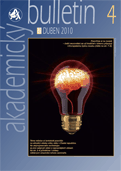DNA decorated by attachment of other molecules
9 Jun 2010
Scientists from the Institute of Organic Chemistry and Biochemistry ASCR have developed a novel simple and efficient methodology for attachment of other molecules to DNA. They prepared DNA bearing very reactive chemical functional groups that can be readily (in one step) linked to diverse other molecules e.g. for studying of molecular mechanism of important biological processes or for labeling of DNA by color or electroactive markers. This methodology has a promising potential for a broad range of applications in interdisciplinary area between chemistry and biology.
CONDUCTING POLYMERS - Formation, structure, properties, and applications
9 Jun 2010
10–14 July 2011 - 75th Prague Meeting on Macromolecules be focused on the main topic - CONDUCTING POLYMERS - Formation, structure, properties, and applications. Characterization of conducting polymers by spectroscopic methods. Modelling and simulations. Molar masses and molecular architecture. Electrical, magnetic, mechanical, optical and other physical properties of conducting polymers.
Consequences of being rich: wealth and population are key drivers of invasive species in Europe

8 Jun 2010
A new study of biological invasions in Europe found they were linked not so much to changes in climate or land cover, but to two dominant factors – more money and more people. Wealth and population density, along with an increase in international trade and commerce, were the forces most strongly associated with invasive species that can disrupt ecosystems and cause severe ecological or agricultural damage, scientists said.
Membrane lipids and cytoskeleton dynamics are intimately interconnected in plant cells

6 Jun 2010
Membrane lipids and cytoskeleton dynamics are intimately interconnected in the eukaryotic cell, but only recently have the molecular mechanisms operating at this interface in plant cells been addressed experimentally. F-actin microfilaments and microtubules are major constituents of the cellular cytoskeleton in plant cells as well. Nevertheless, plant cells are strained by developmental as well as environmental mechanical challenges because of the crucial structural and regulatory function of the cell wall.




